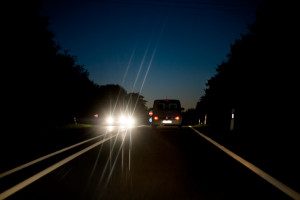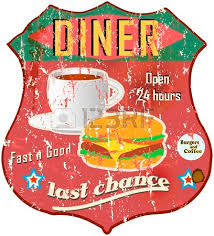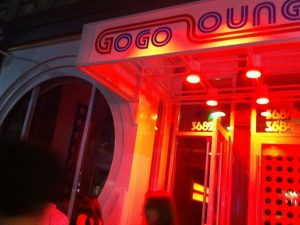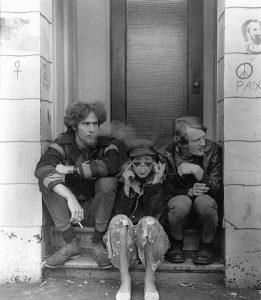
June, 1967 — I received my bachelor’s diploma “on the green pastures of Harvard University.” Bob Dylan used those words to introduce “Baby Let Me Follow You Down,” a longingly lascivious folk tune written by Cambridge’s own Eric Von Schmidt.
We were going to a-go-go and the devil be damned.
Grad school was out. There was a war to stop and California beckoned. I was headed West to join the San Francisco Mime Troupe, a talented den of guerrilla theater artists who used Brecht and commedia dell’ arte techniques to mount raucous, skillful antiwar plays. Filled with the thrill of resistance, I would fuse my New Left politics with a love for folk music and theater. I would become a cultural worker! Huelga!
My cousin Jon, a California boy, had just graduated from UC Berkeley. All year long we wrote back and forth about our Berkeley and Cambridge experiences. He sent sprawling pen and water color drawings inspired by his ingestion of morning glory seeds. I described my life as an off-campus student, carousing in a crazy Putnam Avenue pad, where music and communal living rubbed elbows with academia. Via notes, stamps, and envelopes, my cousin and I began to plan a road trip.
Jon would fly east to attend my graduation and my sister’s wedding. I would scrape together the bucks to purchase a cross-country vehicle with enough space to include my sparse belongings and my mother’s VW bug.
After my father died, my mother sold the family house, moved to New York and took a master’s degree in teaching from NYU. No widow Degelman for her. Now, armed with her M.A., she was returning to her childhood home, Oakland, California.
To accommodate our separate, new trajectories, I found a three-quarter ton GMC panel truck that I could live in, carry stuff, and tow the VW. I had purchased the GMC from a Boston newspaper delivery outfit. Imagine the beating that truck took during its life delivering heavy newspapers over Boston’s twisted, weather-pocked streets. The weary machine popped out of second gear, the floorboards had rusted out from Boston’s snow-salted winter roads, and — as we found out in the first 200 miles of our westward voyage — the used and abused engine consumed oil faster than gasoline.
My friend Gabe, a photographer with a proclivity for painting, swabbed the truck’s side panels a sour-apple green and covered the battered red-orange wreck with giant letters in a font known only to Gabe.
T R U C K, Gabe’s letters shouted.
T-R-U-C-K!
 Day and night we rolled west, armed with a hand-held Bell & Howell camera and a baggie of weed on the dashboard. At night we crashed in a field or a truck stop. There were no rest stops. In 1967, the U.S. highway system was not yet complete. You’d roll along for miles on a broad, six-lane, median-stripped freeway only to be routed onto an unfinished strip of two-lane highway with a suicide strip for passing. Oncoming trucks would blind you with their lights, then rock you with their wash as you barreled past each other at a combined speed of 100 + miles per hour. Crazed motorists would veer into the middle lane to pass, evoking a blare of diesel air horns and flashing lights from oncoming traffic. The cement ridges of the old concrete roadway seduced you into a trance, punctuated only by the flicker of lane markers. It was all so beautiful.
Day and night we rolled west, armed with a hand-held Bell & Howell camera and a baggie of weed on the dashboard. At night we crashed in a field or a truck stop. There were no rest stops. In 1967, the U.S. highway system was not yet complete. You’d roll along for miles on a broad, six-lane, median-stripped freeway only to be routed onto an unfinished strip of two-lane highway with a suicide strip for passing. Oncoming trucks would blind you with their lights, then rock you with their wash as you barreled past each other at a combined speed of 100 + miles per hour. Crazed motorists would veer into the middle lane to pass, evoking a blare of diesel air horns and flashing lights from oncoming traffic. The cement ridges of the old concrete roadway seduced you into a trance, punctuated only by the flicker of lane markers. It was all so beautiful.
 Every day at dusk, I would crawl into the VW and rev the engine. We needed to charge the battery to keep the VW’s taillights glowing into the night. In the morning, we’d pull into a truck stop. These weren’t chain restaurants. They were mom and pop roadhouses that served gargantuan breakfasts: three eggs, sausage patties, grits, biscuits, hash browns, and gallons of coffee, all for about 85 cents. Oh yeah, and gas was 27 cents a gallon.
Every day at dusk, I would crawl into the VW and rev the engine. We needed to charge the battery to keep the VW’s taillights glowing into the night. In the morning, we’d pull into a truck stop. These weren’t chain restaurants. They were mom and pop roadhouses that served gargantuan breakfasts: three eggs, sausage patties, grits, biscuits, hash browns, and gallons of coffee, all for about 85 cents. Oh yeah, and gas was 27 cents a gallon.
Those breakfasts always set us up for a day of driving; the road and the weed rendered me ecstatic by the afternoon. By early evening, my cousin and I were both giddy with Americana. As we headed out onto the Great Plains, the railroad often paralleled the highway. I remember pulling over to the side of the road, leaping out of TRUCK, and dashing up to the gleaming tracks to celebrate the passing power of an oncoming Santa Fe freight train, the roaring diesels glowing with the orange light of the setting sun. Hell, we were both living our own weirded-out version of Kerouac’s On the Road, Walt Whitman’s “I Hear America Singing,” and Barry McGuire’s “Eve of Destruction.”
 By the time we hit Boise, our giddy voyager’s lunacy was beginning to wear thin. We were looking to just… get there! It was dusk, my cousin was driving and I was sitting in the towed VW smoking a joint and revving the engine. A black Cadillac pulled up beside me. It slowed to keep pace. A smiling blonde with a Jackie Onassis flip and a dark-featured driver with a glistening bouffant honked and waved at me. I did a double take and ditched the joint.
By the time we hit Boise, our giddy voyager’s lunacy was beginning to wear thin. We were looking to just… get there! It was dusk, my cousin was driving and I was sitting in the towed VW smoking a joint and revving the engine. A black Cadillac pulled up beside me. It slowed to keep pace. A smiling blonde with a Jackie Onassis flip and a dark-featured driver with a glistening bouffant honked and waved at me. I did a double take and ditched the joint.
The blonde Jackie O. motioned me to pull over. I raised my hands in dismay. I was being towed! I pointed forward to TRUCK. Black Bouffant floored the Cadillac and roared out of sight. My cousin must have been as startled as I. Tethered to TRUCK, the VW bumped over the roadside gravel and stopped.
Silence.
Who were these people? Despite our romantic notions of farmers and mechanics and honest folks, my cousin and I imagined that a great cultural divide loomed between us and Middle America. We projected the strong possibility that whoever we might encounter could be hippie-hating, ball bat-wielding rednecks for whom all strangers were communists. We were wrong. The Cadillac contingent was lovely in real life. The blonde leaned on crutches, a go-go dancer who had broken her leg doing the frug in a cage at the local lounge. The brunette was a Cherokee Indian Princess; her father, chief of “the res.” Hence the Cadillac.
Were we about to be seduced, beat up, or busted? We didn’t know.
“Where are you guys going?”
We told them.
“Oh, wow! You gotta come with us. We want you to meet our friends and tell us all about it!”
“About what?”
“About peace and love and all that.”
“Oh. Well, we don’t…”
“Will you come with us…” they asked. “To meet our friends?”
My cousin and I exchanged glances. “Sure,” we said. “Lead the way.”
For effect, the Princess slapped her dad’s red flashing light onto the roof of the Caddie and away we went into the gathering dusk, blindly following a black Cadillac driven by a Cherokee Indian Princess with a broken-legged dancer riding shotgun. We were going to a-go-go and the devil be damned.
The Caddie pulled into a dusty parking lot before a concrete blockhouse. Lighting up the early evening, a 20-foot neon dancer gyrated on the roof of the lounge.
Inside, our eyes adjusted to the low reds, greens, and purples of the lounge and its dance runway.
“Hey, everybody,” the Princess called out. “These guys are going to San Francisco.”
My cousin and I braced ourselves for a barrage of beer bottles. Instead, we heard murmurs of wonder, then applause and cheers. The lounge’s habitués gathered around us and our escorts led us to a booth. A diminutive denizen in bellbottoms and a paisley shirt punched the keys of a jukebox.
If you’re going to San Francisco
Be sure to wear some flowers in your hair…
*
The next morning, we woke up in a pine-paneled basement rec room. Several of our new friends lay scattered on couches and easy chairs, the coffee-table was littered with beer bottles and full ashtrays, and the record changer was stuck on that tune.
If you’re going to San Francisco
You’re gonna meet some gentle people there
An eye-aching sadness settled over me. All these sleeping kids, so curious about what was happening in these newly mythologized havens, the Haight, Big Sur, Golden Gate Park, about what they might find there, were they ever to leave their jobs, their apartments, their families. There had been no free love circus at the go-go lounge. They had lost friends and brothers to Vietnam and knew we opposed the war. No matter. Our newfound friends asked questions, nodded, listened, responded. They overwhelmed us with soulful curiosity.
 My cousin and I did our best not to discourage our hosts, but we knew the truth of what was happening in the Haight. The year before, there had been about two weeks when the great love collective actually functioned as a free family amidst the beauty of fog and eucalyptus. But the media hype burgeoned, tourist buses appeared, the voyeurs safely glassed off from the freaks clustered on the sidewalks, flower children who were beginning to suffer from speed-laced LSD, venereal disease, and Twinkie malnutrition.
My cousin and I did our best not to discourage our hosts, but we knew the truth of what was happening in the Haight. The year before, there had been about two weeks when the great love collective actually functioned as a free family amidst the beauty of fog and eucalyptus. But the media hype burgeoned, tourist buses appeared, the voyeurs safely glassed off from the freaks clustered on the sidewalks, flower children who were beginning to suffer from speed-laced LSD, venereal disease, and Twinkie malnutrition.
By the time I had left San Francisco in September, 1966, the Haight Free Clinic was drowning in destitute children. The newly weaponized SF Tac Squad swept through the Haight every Sunday afternoon, conducting baton-heavy runaway roundups. The head shops and Free City collectives began to shut down. The media was already hyping the turn on, tune in, drop out myth. The funky, down home ingenuity that had built San Francisco’s beautiful anarchy for decades had paled before the flood began in the summer of 1966. I wasn’t heading for peace and love in San Francisco; I was heading into the apocalypse of resistance.
We bade sweet goodbyes to our newfound friends and headed for the nearest diner to fuel up with another hearty roadside breakfast. As we staggered through the diner’s double-doored foyer, a real honest-to-gawd cowboy, big hat, boots, jeans, and a longhorn belt buckle the side of Texas stood in the doorway. “Outta the West, hippies,” he whooped. “Outta the West!”
Thus began the summer of love and the first day of the rest of my life.
# # #
Writer, editor, and educator based in Los Angeles. He's also played a lot of music. Degelman teaches writing at California State University, Los Angeles.
Degelman lives in the hills of Hollywood with his companion on the road of life, four cats, assorted dogs, and a coterie of communard brothers and sisters.



Wonderful story, Chaz, written with all your verve and clear-eyed assessment of the situation in 1967. I love your description of TRUCK, your hearty breakfasts, taking time to listen to the trains passing by and thinking of the poetry of Whitman, Kerouac and Barry McGuire (that song still rings in my ears…I fear we may be on the eve of destruction again); truly experiencing the American heartland passing by.
Great story mid-way of your encounter with your one-legged go-go dancer, Indian princess and friends. And to end with the account of what was really happening in the Haight district was astonishing. Brought the whole history of the “Summer of Love” home for all of us who only know the songs and the myth. A great piece of writing and history lecture. Thank you so much.
Thanks for your supportive thoughts and words. And thanks for your patience with my long-winded summer of love offering. I was a bit surprised at the dark turn this story took and take pleasure in your comments about the history of our summer of love dreams. Of course, life is complicated, and the summer of love should remain all things to all people, as they perceive it.
Great story. Reading about your road trip, the images were so clear I could almost imagine riding along. What fun! And wow, that Cadillac in Boise really took me by surprise. What an amazing little side trip that must have been!
Your description of what SF was like by the summer of ’67 was depressing, and not the way I want to imagine it. No longer peace and love, but the apocalypse of the resistance. I’m all for resistance, but was there really no shred of the peace and love vibe left?
Yeah, bouffants in Boise. What a short, strange trip that was! And peace and love in 67. I’ll remind you of other aspects of that time I shared on Retro.
like this… … or this….
After all, we are writing about impressions, and the author invariably distorts reality when he or she tells it like it is, verdad?
Thanks for the links. I greatly enjoyed re-reading those two earlier stories of yours now, with a different perspective.
I think I posted one about the Mime Troupe as well.
Fabulous story, populated with unforgettable characters including a TRUCK. It strikes me that none of this week’s Summer of Love stories (so far) actually takes place in San Francisco—one in Provincetown, one in Syracuse, one at camp in Michigan, and one on the road. Yet all four tell of experiences that are truer to the Summer of Love mythos than what you report was actually happening in the Haight.
Thanks, John! They must have been unforgettable because here I am writing about them 50 big years later. Of course, life is too complex to capture, and there were many, many beautiful moments and movements and magic in that summer, and in the years to follow.
My dark impression in ‘Outta the West’ grew out of the colors of the story as I felt it. You may recall other impressions of that time in San Francisco in some of my other Retro posts. Life’s a kaleidoscope!